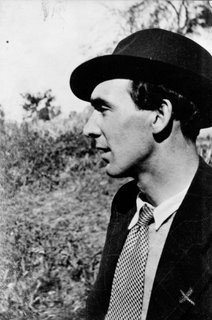 George Barker (pictured here) was one of the major British poets of the brief period sometimes described as "New Romanticism" - roughly late 30s to end of the 40s. I have recently been preparing a lecture on the poetry of this time, and reading work by the Apocalyptic Henry Treece, W.S. Graham, and of course, Dylan Thomas.
George Barker (pictured here) was one of the major British poets of the brief period sometimes described as "New Romanticism" - roughly late 30s to end of the 40s. I have recently been preparing a lecture on the poetry of this time, and reading work by the Apocalyptic Henry Treece, W.S. Graham, and of course, Dylan Thomas.What struck me instantly was that, wherease Treece has gifted posterity with no memorable poem (and is thus almost fully neglected now by 21st century readers); and Graham moved on to create his best work in the 50s-70s; and Dylan Thomas wrote perhaps a dozen of the greatest modern lyrics - well, George Barker didn't quite do any of these things.
That is, his poems are not instantly unmemorable, nor did his best work flower in him later to allow us to ignore or forgive his youthful brilliance, nor did he - and this is the delicate part - ever seem to write a poem that quite works all the way through - that is, Barker seems to have written perhaps a dozen of the nearly-greatest modern lyrics.
Don't misread me. I think he is a very worthwhile poet, one unjustly less-read these days - and he is dreadfully ill-served by a lack of a very slim, tighly-edited Selected, which could clear the air, and present him not as the author of long, intermittently weak or rambling verse - but as someone who was at home in shorter forms.
If I was to edit such a slim Barker Selected, the heart of the book would contain the following poems, all drawn from anthologies of the period (these are some of the poems for which he was known, loved and respected then): "The Seal Boy"; "Summer Idyll"; "He Comes Among" (this chosen by Yeats for his Oxford book); "To My Mother"; "Summer Song I"; " ' Turn on your side and bear the day to me ' "; and "To Whom Else".
There are maybe four or five more of these kinds of brief, lyric poems, and a few dozen more could be found to round the collection off.
Of even these better poems (one hesitates to claim them as the best) a stumbling-block, surely, is the urge to make puns. What might be generously termed "word-play" can become a tedious tic. I can accept "mourning" in to "morning" and vice versa, but am somewhat repulsed by the dog/god binary - it is simply too obvious to be of much lasting interest or resonance.
Barker's strength is in his force, his immediacy, his energy, his passion, his drive - he had no less of a green fuse than Thomas.
"Summer Idyll" seems, to me, very lovely, with a superb ending, and might stand as one of his great poems. Surely, the author of such poems as these needs a new editor, and new readers, to realize what we have been missing - an exemplary lyric voice at the great mid-way point of the last century, and a daring rival for the crown of eloquence all-too-easily bestowed on Thomas.
Comments
دانلود آهنگ محسن چاوشی امام رضا